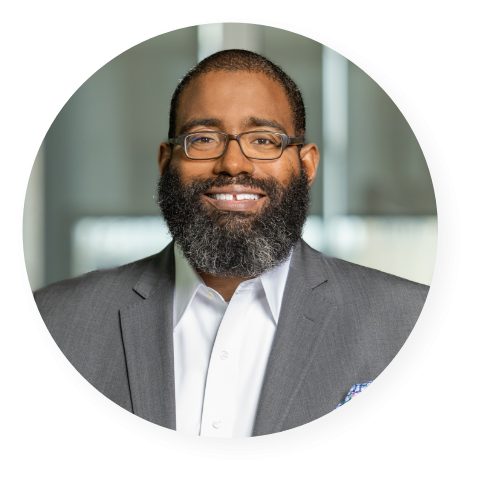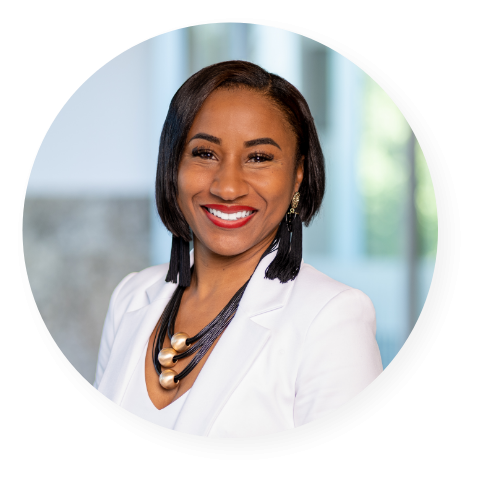The Office of Diversity, Equity, and Inclusion seeks to reimagine practices, programs, and policies that create inequitable outcomes for Wake County residents. From interpersonal to infrastructure, ODEI is charged with advancing efforts for inclusive prosperity.

DANYA PERRY
(HE/HIM/HIS)
Director
Office of Diversity, Equity & Inclusion

CHRISTAL CARMICHAEL
(SHE/HER/HERS)
Program Manager
Division of Race Equity

MOLLY MARCOTTE
(THEY/THEM/THEIRS)
DEI Consultant
Division of Organizational Development

QUIANNE’ HOLMES
(SHE/HER/HERS)
DEI Consultant
Division of Organizational Development

MONIQUE PRIESTER
(SHE/HER/HERS)
MWBE Program Manager
Division of Business Inclusion
Mission
To promote a culture that is welcoming, affirming, diverse, equitable and inclusive in order to foster a sense of belonging for (Team) Wake and beyond, with the goal of advancing human potential and growth.
Organizational Long-Term Goals
A Workplace That Reflects the Community It Serves
We will actively work to eliminate racial and other disparities and provide accommodations for people with disabilities in hiring, promotion and retention.
Equitable Service Delivery to Residents & Visitors
We will provide guidance, education and assistance to all departments as they develop sustainable methods to build capacity in achieving equitable outcomes and services.
Purposeful Community Outreach & Engagement
We will work with community partners and businesses to promote equity and inclusion within Wake County and throughout the region, producing measurable improvements and disparity reductions.
Support Human Rights & Opportunities for Everyone to Achieve Their Full Potential
We will promote, support and build capacity for compliance with civil rights laws, ordinances and regulations within Wake County.
Commitment to Equity in Policy Decision Making
We will be transparent and collaborative with internal and external individuals and groups, holding ourselves and our partners accountable for measurable improvements and outcomes.
Our Organizational Structure
The Office of DEI includes three divisions: the Division of Organizational Development, Division of Race Equity and the Division of Business Inclusion.

Division of Organizational Development
Our Why
Team Wake views diversity, equity and inclusion (DEI) as more than buzzwords or a checklist, but rather an opportunity to create transformative cultural change for our employees and our customers. Extensive research has emerged on the impacts of employer DEI strategies; a diverse, equitable and inclusive workplace results in higher productivity, engagement and overall organizational success. Moreover, beyond productivity or any workplace outcomes, we believe at our core that every member and customer of Team Wake deserves to feel safe and celebrated – period.
This is our why: our employees and our customers. We are charged with mobilizing the county’s DEI priorities in our region and community. We envision a community that embraces diversity, embeds equity into all and practices inclusion in each policy, program, practice and service.
An organization that cultivates a representative workforce, one that reflects our region’s evolving demographics, is fundamental to our growth and sustainability.
An organization that cultivates equitable and inclusive environments for this representative workforce is key to our collective success.
Centering DEI in the workplace enhances an organization’s opportunities to tap into their peoples’ abundant potential. When we create transformative workforce experiences and expand human growth potential for Team Wake, we enhance our ability to serve the public. Our DEI strategies allow us to:
- Actualize our Core Values
- Facilitate interpersonal development
- Improve employee experience and performance
- Develop opportunities to innovate practices and programs
- Increase employee retention
- Attract transformative talent
Our Approach & Implementation Model
We all have a role in the transformative work of DEI. We cannot accelerate progress, foster innovation or reimagine for success without intentional, organization-wide strategy and buy-in. We acknowledge the hard work and discomfort in changing organizational culture, but ultimately it yields positive outcomes for all.
The Division of Organizational Development is positioned to lead and support the successful implementation of strategies to integrate DEI into our workforce. These strategies are scalable by careful planning, total collaboration and lifting the voices of all with lived experiences.
We follow a 3-tiered implementation model that builds on existing successful practices and takes the opportunity to reimagine for change. This scalable model focuses on:
Tier One | Fluency Building
Tier One centers on opportunities to increase our collective knowledge, build fluency and normalize DEI-centered discussions. Tier-One activities are available to the entire enterprise and are continuous learning opportunities.
Examples: Lunch & Learns, DEI Champion Certification, & DEI Onboarding Training
Tier Two | Applied Skill Building
Tier Two recognizes the unique short-term needs of each department, division and team. This tier complements the fluency building of Tier One and supports applied skill building. Upon request, Tier Two engagement allows for DEI-centered process improvement projects, in-depth professional development and training.
Examples: DEI-centered professional development/team building sessions, coaching/consultation & development of curriculum for applied skill building
Tier Three | Comprehensive Customized Capacity Building
Tier Three is holistic and ongoing engagement with a department to implement sustained DEI-centered interpersonal and infrastructure changes. Each department is unique and requires a unique and customized approach for success. Participating departments are assigned a DEI Consultant, who collaborates with leadership and staff to develop a DEI plan of action.
Examples: Listening tour, focus groups, strategic integration into business plan and identifying outcome measures/data
Our Theory of Change
To learn more about our approach and implementation model, please download the Theory of Change.
Our Focus Areas
People
An organization that prioritizes people, their lived experiences, and continued opportunities to work across difference.
It starts with you – from self-reflection to formal performance assessments, the goal is to increase our human potential. Part of this is prioritizing interpersonal development between colleagues and a critical component of DEI implementation. Creating the space to learn and live through diverse experiences and challenging personal bias will help close the “empathy gap.” The empathy gap reduces our ability to work across difference and derails attempts to create an transformative organization. Focusing on the experiences of the people of Team Wake allows for the fostering of dignity and respect needed to advance DEI.
Practices
An organization that advances and implements best practices is far more likely to sustain innovation and success.
Moving from people to practice takes time – it is a marathon. After self-reflection, successful implementation launches from sustained practices. Changing and reimagining individual and organizational practices are not easy; however, it is a reflection of a learning organization that is investing in what works and disengages with what doesn’t work. It takes practice to change a practice – from diversifying hiring panels to differentiating our engagement with the community.
Programs
An organization that implements programs to mitigate disparities and ensure equity, creates opportunity for inclusive prosperity.
Ensuring equity requires the intentional analysis of programs that impact diversity and inclusion. Programs include efforts that impact internal DEI-goals and external outputs in our public service. From the allocation of resources to an analysis of rule-making, a transformative organization seeks continuous improvement and asks the question – who benefits and who is burdened? Developing internal programs to build bridges or remove barriers for historically underrepresented populations is critical, as is ensuring that our external-facing programs are equitable in intent and accessibility.
Policies
An organization that embodies DEI ensures sustainability through thoughtful policy and decision making.
Policies and procedures are an essential part of any organization. Together, policies and procedures provide a roadmap for day-to-day operations. They ensure compliance with laws and regulations, give guidance for decision making and streamline internal processes. As stated, the creation of equitable policies to sustain a work environment that is free from discrimination and harassment on the basis of personal identities are the foundation of DEI. From ethnicity to gender identity, equitable policies are necessary in “setting the bar” for our Core Values. Organizations with strong DEI policies are more likely to have employees with increased job satisfaction, higher levels of trust, and greater engagement.
Division of Race Equity
Our Why
A list of common questions with clear, helpful answers about how to respond to and/or approach racial equity initiatives, inquiries and processes that help address/dispel misconceptions.
Our Statement & Charge
We acknowledge there is a high quality of life in the region for many, but for those who have been historically underserved, underrepresented and marginalized, there is a different reality altogether. That reality is rooted in systemic racism. It has permeated the justice system, created monumental education, health and wealth disparities between black, brown and white Americans, and resulted in discriminatory practices. This moment is the culmination of such injustice.
The initiative is calling for community members and organizations to visit abetterwake.com to join us in committing to end racism. The website also includes an action guide to provide guidance on practices and policies to aid collective efforts. Additionally, the website has a curated list of books, videos and other resources to aid individuals in learning more about anti-racist concepts. Part of dismantling the systems of racism starts with individuals changing their attitudes and behaviors, which leads to dissecting how infrastructures are built with inherent bias.
Many of us are struggling with “what to do next” and “how can we support” the elimination of systemic racism. In honoring the victims of racism, both past and present, A Better Wake seeks to support our community in advocating and building our fluency in the areas of anti-racist practices, programs and policies.
Our Blueprint
To reimagine systems that create inequitable outcomes for Black and Brown residents, the aforementioned partnership built on the longstanding work in the community to create a Blueprint to Dismantle Systemic Racism in Wake County, North Carolina. The Blueprint is a living document comprising more than 40 goals and 150 near-term action items that organizations can take to address systemic racism. It was created by a group of more than 50 leaders from community-based organizations who met as working groups from June through November 2021. Working groups drafted goals and ideas to transform Wake County into a place where Black and Brown residents experience equity in every aspect of their lives. The work of this group – focused on economic mobility, criminal justice, education and health equity – is designed to evolve over time through an ongoing and collaborative process. As a result, the Blueprint is the beginning of a long-term effort to create lasting change.
Our Focus Areas
ECONOMIC MOBILITY
A Wake County where Black and Brown residents are free to choose and pursue their desired path of economic mobility and prosperity without hindrance.
To achieve this long-term vision, the Economic Mobility working group developed goals to support each aspect of Black and Brown residents’ path toward greater economic opportunity and stability. The goals range from affordable housing rental and ownership options and workforce skill development and employment, to small business contracting opportunities for business owners of color, and personal financial wellbeing. The intended result is a strengthened economic mobility ecosystem in which residents of color can define and achieve their personal vision of prosperity.
CRIMINAL JUSTICE
A Wake County where Black and Brown residents do not have disproportionate contact with the criminal justice system, and all its institutions and organizations are coordinated to serve and support citizens equitably.
To achieve this long-term vision, the Criminal Justice working group developed targeted goals at several points on the continuum of the criminal justice system to pursue change that could impact Black and Brown residents from elementary school to adulthood. The long-term, anticipated results of these efforts are a reduced criminal justice presence in Wake County, accurate and accessible data about the criminal justice system, and increased trust between Black and Brown residents and local law enforcement and court representatives.
EDUCATION
A Wake County with an equitable education system in which Black and Brown children have unfettered access to the experiences and environments that enable them to become their full and best selves without systemic barriers.
To achieve this long-term vision, the Education Equity Group set goals to comprehensively support Black and Brown students and make schools into safe and supportive learning environments. Examples of goals include strengthening the cultural competency of educators; improving mental health services for students of color, teachers and administrators; addressing the current pipeline from disciplinary actions in schools to prison; and increasing the voice and power of families within the school system. The long-term impacts of these goals are increased capacity within school administrators and teachers about youth development and racial equity, a reduction in disciplinary actions, and an elimination of the overrepresentation of Black and Brown students receiving disciplinary actions.
HEALTH
A Wake County with a healthcare system in which Black and Brown residents can attain their highest level of health and well-being.
To achieve this long-term vision, the Health Equity working group developed goals to increase healthcare access for Black and Brown residents, improved data to represent people of color accurately within the broader healthcare system and strengthen data as a tool for greater accountability about healthcare accessibility in Wake County. The desired result of this work is healthy Black and Brown residents who have access to the healthcare they need to thrive.
Our Projects
Living Wage
The Wake County Board of Commissioners desire to support and encourage businesses that offer their employees a living wage. When workers are paid a living wage, they are able to adequately provide for themselves and their families. They are able to avoid stress such as holding (or seeking) multiple jobs to make ends meet, acquiring crippling amounts of debt, or relying on financial assistance from family or friends. Because a living wage means workers can earn enough to provide for their basic needs by working fewer hours, it also means that workers can have more time to spend with their children, spouses, and friends. But the benefits of a living wage aren’t limited to the workers earning a living wage themselves. Having living wage employers in a community can create a ripple effect that raises the standards within a given industry or geographical area.
To learn more about how to become a certified employer, send us an email here.
One Water
Wake County, with assistance from its municipalities, residents and partners (“Our Community”) is developing a One Water Plan that supports equitable access to clean and abundant water for the next 50 years and beyond. Clean water is not guaranteed. Today’s water management needs are connected to many aspects of building a strong and resilient community that extend beyond just water to other economic, social and environmental needs.
Learn more about the 50-year Clean Water plan here.
Food Justice
Wake County is committed not only to equitable outcomes, but to processes rooted in equity. The Food Justice Cohort will be responsible for ensuring equitable use of and access to funds in the Wake County Food Security Plan 2023.
Learn more about the Food Security Plan and the Food Justice Cohort here. If you're interested in applying for a grant opportunity or would like to get involved, email us here.
Division of Business Inclusion
Our Why
At Wake County Government, we believe in the power of small businesses and organizations to provide innovative facilities, supply best in class goods and services, administer industry leading customer services, and maintain the security and safety of residences and visitors. Wake County small businesses and organizations provide jobs, drive economic growth and ensure our stakeholders feel heard and supported. One of the ways we achieve our goals and live our County Core Values is by helping businesses and organizations understand the procurement and contracting process at Wake County Government. At the County, we recognize how these processes can impact marginalized and underrepresented small business owners.
Wake County Metropolitan Area

45% Women-Owned Businesses

6.6% Veteran-Owned Businesses

30.4% Minority-Owned Businesses

146,349 Small Businesses

262,292 employees are employed by small businesses.

98.9% of all business in the Wake County Metropolitan Area are small businesses.

47.5% of employees work for a small business.
Source: 2023 SB Profile US SBA Office of Advocacy
While many small businesses and organizations face challenges, the Division of Business Inclusion understands the unique disparities faced by underutilized and disadvantaged minority-owned businesses, women-owned businesses and other marginalized small businesses and organizations in the procurement and contracting process. To help us identify, understand and address those inequalities, Wake County launched a disparity study in 2022 to help ensure equity in the way the County spends its resources. Learn more about the results of the study and the ways Wake County Government is focused on strengthening business opportunities for people of color and women. Disparity Study
The Board of Commissioners and Wake County Government are both committed to addressing disparities within our procurement and contracting process, fostering greater participation and access to contracts for small businesses and organizations, and encouraging small businesses and organizations to thrive throughout the greater Wake County region.
Our Commitment
- Promote, advocate and facilitate the growth and inclusion of business enterprises and workforces
- Identify, create and provide access opportunities for underutilized, underrepresented or disadvantaged businesses
- Create economic access and understand barriers within the procurement process
- Reaffirm that neither Wake County, nor its contactors and vendors, discriminate based on race, age, color, religion, sex, sexual orientation, gender identity, national origin, ancestry, gender, disability, place of birth, or military service in the award and performance of contracts or projects

33.3 million US Small Businesses

Small Businesses make up 99.9% of all Business.

Black owned businesses make up 11.1 % of all US small businesses. These businesses have increased gross revenues 43% and paid out $53.6 billion in payroll.

Women Owned businesses make up nearly half of all small business, 43.4%.

5 million Hispanic owned businesses in the US represent employers of over 100 million people, and a contribution of $800 billion to the US economy.

Veterans and Service-Disabled Veterans own 1.7 million small businesses, or 5.1% of all US small businesses. These groups make up one of the largest single business enterprise groups from a revenue standpoint and contribute $1 trillion to the economy.

There are more than 3 million AAPI owned small businesses in the US, concentrated in 30 metropolitan areas.

One in four adults in the US live with a disability. People with disabilities are twice as likely to be self-employed. Disability-owned business enterprises have over $1.26 billion in annual revenues.
Our Focus Areas
Minority and Woman-Owned Business Enterprise MWBE Program
Wake County is where small businesses and entrepreneurs are free to choose and pursue their desired path of economic mobility and prosperity without hindrance
The MWBE Program seeks to reduce barriers to participation in the bidding and awarding of Wake County Government procurement contract and project opportunities. Please visit Doing Business for more information on doing business in and with Wake County.
Small Business Development
Capacity creation for marginalized small businesses throughout Wake County.
Community Partnership Strategies
Building community collaboration by way of intentional thought leadership and strong private-public partnerships (P3).

7 out of 10 consumers intentionally support businesses that are racial justice, LGBTQ+ rights, and climate conscious centric.

The breakdown of Generational Small Business Ownership
- 13% Millennials (Born 1981 – 1996)
- 47% Gen X (Born 1965 – 1980)
- 40% Boomers (Born 1955 -1964)

Small businesses generate more than 44% of U.S. economic activity.

91% of consumers have a preference to support small business.
Our Future Business Development Initiatives
-
Small Business Enterprise SBE/Small Local Business Enterprise SLBE
-
Veteran Business Enterprise VBE/Service-Disabled Veteran Business Enterprise SDVBE, Disabled Person-Owned Business Enterprise, Limited-English Proficiency-Owned Business Enterprise, LGBTQ+ Owned Business Enterprise, and Disadvantaged Business Enterprise DBE Program Support
-
Non-profit Enterprise Development
-
Certification Support, Technical Assistance, and Other Supportive Services
-
Workforce Development
-
Limited-English Proficiency
-
Sustainability (Regulatory, Green, Innovation and Continuity of Business)
-
B-Corps
If you are interested in supporting, partnering or providing resources to the small business ecosystem in Wake County, email us here.
